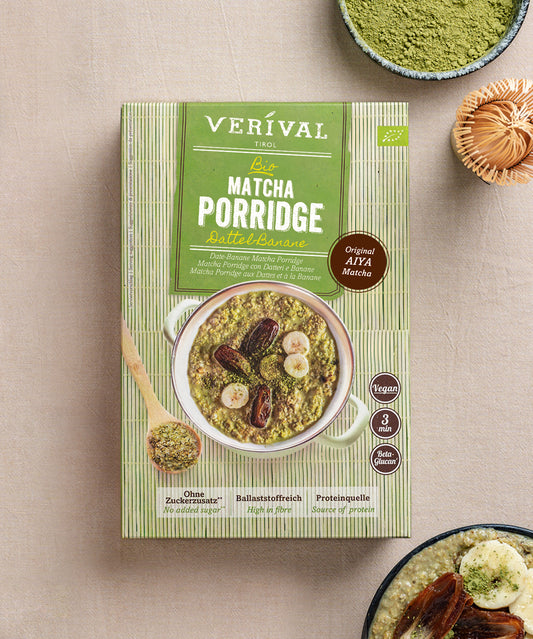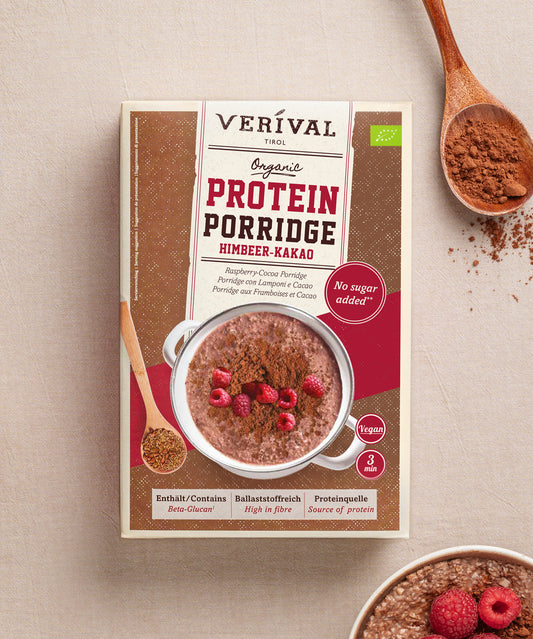A healthy gut flora is essential for us to feel completely comfortable and healthy throughout our lives. If the microbiome in the gut is disturbed, it can affect our well-being and reduce our quality of life.
In our article, you will learn everything you need to know to protect your gut health and build a healthy gut flora.
Healthy breakfast from VERIVAL – try it now!
Introduction
When we talk about intestinal flora, we mean the colonization of numerous different bacterial strains in the intestines of humans and animals. It is also called the microbiome and fulfills some essential tasks. It is responsible for ensuring that our body absorbs nutrients from food during the digestion process. In addition, the intestinal flora plays an important role in our immune system.
A disrupted intestinal flora can have many different causes, ranging from diet and lifestyle to the intake of medication. If your gut health is not one hundred percent in tact, it can manifest itself through various symptoms. These can range from known digestive problems to fatigue, skin problems and mood swings. For this reason, it is extremely important to take good care of a healthy gut and to strengthen the intestinal flora.
Possible causes of a disturbed intestinal flora
A disturbed intestinal flora can have many different causes, which is why the background should always be considered individually and examined by a doctor. We have summarized the most common reasons below:
Nutrition
The first and most obvious reason is diet. A healthy diet that provides all the essential micro- and macronutrients is the basis for healthy intestinal flora. If certain nutrients are not supplied in sufficient quantities through the diet, this can manifest itself in the form of disturbed intestinal flora.
The most important nutrients for a healthy gut include:
- Dietary fiber: These are indigestible components of plant-based foods. They are found, for example, in whole grain products, legumes, vegetables or nuts. Although they are not digested, they still play an important role in the digestive process. By binding water, they help you feel fuller for longer and also regulate blood sugar levels. They serve as food for healthy intestinal bacteria and are therefore important for a healthy intestinal flora. In addition, they increase the stool volume and thus stimulate intestinal activity, which can help prevent constipation.
- Probiotics: The keyword probiotics is almost always mentioned when talking about intestinal health. These are microorganisms, such as lactic acid bacteria, that support the development of healthy intestinal flora. They are found in fermented foods such as yogurt, kefir, sauerkraut, and kimchi.
- Prebiotics: These are also dietary fibers that serve as food for the health-promoting bacteria in the intestines and thus promote the microbiome in the intestines.
On the other hand, there are also a number of foods that can throw your intestinal flora out of balance and have a negative effect on the diversity of bacteria in the gut. These include, for example, heavily industrially processed foods and foods that are particularly high in sugar and fat. They disrupt the intestinal flora and can thus lead to digestive complaints.
Healthy breakfast for a healthy gut – discover it now!
Antibiotics
Antibiotics are medications used to treat bacterial infections. The catch is that they not only eliminate pathogenic bacteria, but also attack the healthy bacteria in our intestines, which can throw the intestinal flora out of balance.
The use of antibiotics is often unavoidable, because an untreated bacterial infection can have far-reaching health consequences. Taking antibiotics too often, on the other hand, can lead to antibiotic resistance. This means that the drugs lose their effectiveness. That is why it is particularly important to strictly adhere to the dosage prescribed by your doctor.
To prevent disrupted intestinal flora during antibiotic treatment, you can support your body with targeted measures to promote intestinal health.
Stress
There are numerous studies on the influence of stress on the body. Some of them deal with the connection between stress and the microbiome in the gut. For example, a study by Hantsoo & Zemel (2021) showed that both acute and chronic stress can disrupt the intestinal flora. The study also showed that the effects of stress can be buffered by taking probiotics, prebiotics, and omega-3 fatty acids.
Those affected by an imbalance in their gut flora usually look to their diet first to find the possible causes. However, the research findings show that it can also be worthwhile to evaluate your lifestyle as a whole and to pay particular attention to stress factors. To promote intestinal health, it is therefore not only important to ensure a balanced diet, but also to reduce stress and actively promote relaxation.
Infections
Infections can lead to an imbalance in the intestinal flora in a variety of ways. The antibiotic treatment of infections mentioned earlier is just one of them. In addition, inflammation in the intestine can also affect the intestinal flora. This can lead to the health-promoting bacteria growing only to a limited extent, creating an imbalance among the bacterial strains.
Furthermore, infections can alter the pH value in the gut. This also throws the microbiome out of balance. Depending on whether the intestinal environment is acidic or alkaline, certain bacteria can grow well or less well. And last but not least, a gastrointestinal infection in particular changes intestinal motility, which means that nutrient absorption no longer works optimally.
Other factors
In addition to the causes of an imbalanced intestinal flora described above, factors such as environmental toxins, (chronic) diseases and age can also affect intestinal health.
We absorb toxins and environmental pollutants through our food, for example, when we eat foods that have been contaminated with pesticides. But these toxins also include chemical ingredients used in industrial food processing to preserve products, for example. For this reason, you should mainly eat natural foods in organic quality.
Diseases such as Crohn's disease or irritable bowel syndrome can also be responsible for an intestinal flora disorder. So this should always be clarified first with the help of a doctor.
And lastly, the intestinal flora also changes with age, which can lead to an imbalance of intestinal bacteria.
Symptoms of an intestinal flora disorder
In addition to the causes of an imbalance in the intestinal flora, there are also many different symptoms that can indicate this imbalance.
Digestive complaints
Various types of digestive complaints can be a classic sign of an imbalance in the intestinal flora. The most common symptoms include bloating, constipation, diarrhea and abdominal pain. Whether an imbalance in the intestinal flora is actually the cause of these complaints should always be clarified by a doctor.
Tiredness and exhaustion
In addition to the obvious symptoms such as the digestive complaints just described, tiredness and exhaustion are also common symptoms of an imbalanced gut flora. Those affected are no longer able to absorb nutrients as well, which affects energy levels and can lead to symptoms such as tiredness and exhaustion.
Skin issues
If the intestinal flora is out of balance, this can also lead to skin problems and acne, among other things. A study by Mahmud et al. (2022) summarizes that a disturbed intestinal flora is also associated with various skin diseases. The mechanisms behind this are not yet clear, but one possible explanation draws on the connection between the intestinal flora and the immune system and indicates that a disturbed intestinal flora can lead to an overactivation of the immune system. This in turn leads to symptoms such as skin problems,
mood swings and depression.
Even though the studies are inconclusive, a review by Schrodt et al. (2022) suggests that there is a link between the microbiome and depression. The studies were able to show that the bacteria in the gut of healthy people differ from those of people suffering from depression. However, it is not clear whether the depression changes the microbiome or whether the disturbed intestinal flora is involved in the development of depression and mood swings. However, increased intake of probiotics and prebiotics seems to provide symptom relief.
Other symptoms
Other symptoms associated with a disrupted intestinal flora include allergies and food intolerances. This is because a healthy intestinal flora plays an important role in our immune system. The bacteria in the intestine train it, so to speak, to classify harmless substances such as allergens as harmless. In addition, a healthy intestinal flora is needed to activate the immune system's defense cells. This brings us to another symptom of an imbalanced gut flora: a weakened immune system. When the gut is unhealthy, the immune system cannot work as effectively as it should.
Prevention and treatment
Those with an imbalance in their gut flora usually suffer in terms of their health and well-being. That's why the top priority is to restore a healthy microbiome as quickly as possible. The best way to achieve this is to change your diet and take probiotics and prebiotics.
Changing your diet
If you suffer from an imbalance in your gut flora, it makes sense to start with your diet to quickly improve your gut health. It is particularly important to pay attention to your fiber intake and to eat foods such as whole grains, legumes, and vegetables. Fiber serves as food for healthy gut bacteria and thus promotes their growth. If you eat a lot of fiber, you should also drink enough fluids to avoid negative effects such as constipation.
In addition, you should reduce your sugar intake and, above all, avoid highly processed foods. Sugar can promote the growth of harmful bacteria and lead to inflammation.
Probiotics and prebiotics
Another important way to promote gut health is to take probiotics and prebiotics. You can take probiotics both through your diet and in the form of dietary supplements. However, dietary supplements are no substitute for a balanced diet and should therefore only be used for a short time to provide support. Probiotics are found in fermented foods such as kefir, yoghurt and sauerkraut.
Prebiotics are dietary fibers that occur, for example, as beta-glucans in mushrooms, oats, barley or algae or as fructooligosaccharides in bananas, asparagus, chicory, Jerusalem artichoke, garlic and onions. Oatmeal and porridge therefore provide you with a healthy breakfast for your gut.
Prebiotic breakfast for a healthy gut – try it now!
Summary and final thoughts
In summary, it is extremely important to maintain a healthy microbiome, because a disturbed intestinal flora can cause a number of undesirable problems. The imbalance of intestinal bacteria can have many different causes and can manifest itself in the form of a wide range of symptoms. An imbalance in the microbiome can manifest itself in the form of digestive problems, persistent fatigue, skin problems or mood swings. The causes can range from an unbalanced diet to stress, taking medication or infections.
It is always important to consult a doctor to determine the cause of the symptoms in order to rule out illnesses and other medical causes. After that, you can support the treatment of the disturbed intestinal flora by ensuring a balanced diet and integrating prebiotics ( prebiotic foods ) and probiotics into your diet. These are also the best ways to protect your gut health preventively against an imbalance.
Breakfast by VERIVAL for a balanced diet
Sources:
Hantsoo, & Zemel, B. S. (2021). Stress gets into the belly: Early life stress and the gut microbiome. Behavioural Brain Research, 414, 113474–113474. https://doi.org/10.1016/j.bbr.2021.113474
Mahmud, Akter, S., Tamanna, S. K., Mazumder, L., Esti, I. Z., Banerjee, S., Akter, S., Hasan, M. R., Acharjee, M., Hossain, M. S., & Pirttilä, A. M. (2022). Impact of gut microbiome on skin health: gut-skin axis observed through the lenses of therapeutics and skin diseases. Gut Microbes , 14 (1), 2096995–2096995. https://doi.org/10.1080/19490976.2022.2096995
Schrodt, Mahavni, A., McNamara, G. P. J., Tallman, M. D., Bruger, B. T., Schwarz, L., & Bhattacharyya, A. (2022). The gut microbiome and depression: a review. Nutritional Neuroscience, ahead-of-print(ahead-of-print), 1–7. https://doi.org/10.1080/1028415X.2022.2111745
Frequently asked questions
How can you tell if you have a disrupted gut flora?
A disturbed intestinal flora can manifest itself through a variety of symptoms. The most well-known include digestive complaints, tiredness and exhaustion, skin issues, as well as mood swings and depression.
How can you rebuild a disturbed intestinal flora?
The best way to rebuild a disturbed intestinal flora is through a balanced diet. The intestines should be supplied with sufficient fiber, which not only stimulates digestion but also serves as food for healthy intestinal bacteria. In addition, probiotics and prebiotics can be taken to support a healthy intestinal flora through food or as a dietary supplement.
What should you eat if you have a disturbed intestinal flora?
If you have an imbalance in your gut flora, you should eat foods that are particularly high in fiber and take probiotics (e.g. kefir, yogurt, sauerkraut, kimchi) and prebiotics (e.g. root vegetables, bananas, oats). If you eat a lot of fiber, you should also make sure to drink enough, otherwise you may experience constipation.
Can stress affect the gut and digestion?
Studies show that stress can have a negative effect on the microbiome in the gut. It upsets the balance between healthy and harmful bacteria and disrupts the intestinal flora.
Does the gut affect the skin?
Yes, the gut and skin are connected via the gut-skin axis, so that a disturbed intestinal flora can lead to skin problems and skin diseases.
What is irritable bowel syndrome?
Irritable bowel syndrome describes a disorder of the digestive organs in which abdominal pain and digestive problems such as diarrhea or constipation occur repeatedly.
What effect does fiber have on the intestines?
On the one hand, fiber increases the stool volume and stimulates intestinal activity due to its ability to bind fluids. On the other hand, prebiotics, a special form of fiber, serve as food for the health-promoting bacteria in the intestines and thus ensure a healthy intestinal flora.
























